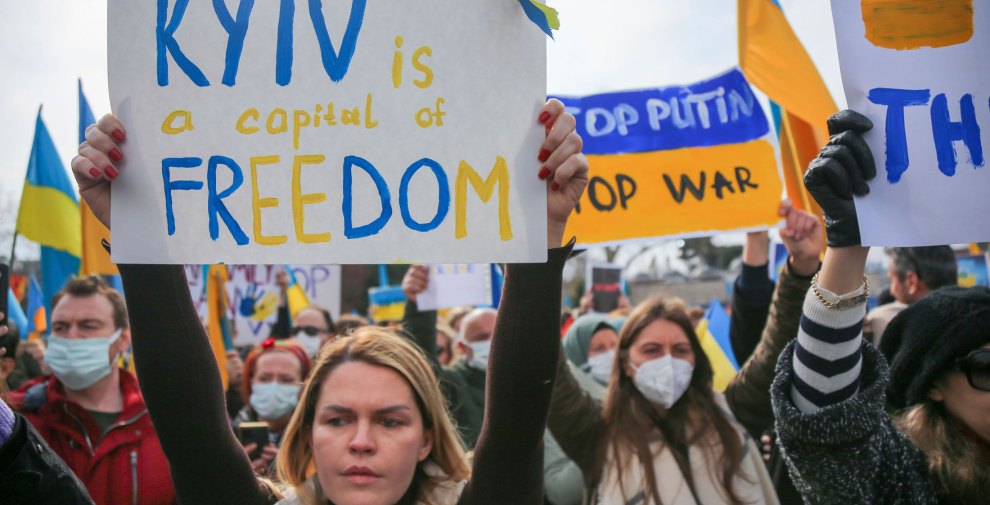
On the fourth day of the attack of Russian military troops on Ukraine, Ukrainian citizens and anti-war demonstrators gathered on Beyazit Square in Istanbul to protest against Russia and Russian President Vladimir Putin. Hakan Akgun / SOPA Images/Sipa USA/AP
On Sunday, Ursula von der Leyen, the president of the European Commission, the European Union’s executive branch, announced that in addition to barring all Russian aircraft in European airspace, the European Union is going to crack down on “the Kremlin’s media machine in the EU”—namely its state-run media outlets Russia Today and Sputnik. The EU, Leyen said, would develop tools to “ban the toxic and harmful disinformation” spreading through Europe, which in the days since the invasion of Ukraine has included false claims from Putin that Ukraine’s government has committed genocide against its own people. Ukraine has dismissed those claims as untrue in a suit filed Sunday to the International Criminal Court and called on the United Nation’s highest court to order a stop to Russia’s invasion.
Second, we will ban the Kremlin’s media machine in the EU.
The state-owned Russia Today and Sputnik, and their subsidiaries,
will no longer be able to spread their lies to justify Putin’s war.
We are developing tools to ban their toxic and harmful disinformation in Europe. pic.twitter.com/7RcPEn6E14— Ursula von der Leyen (@vonderleyen) February 27, 2022
Both RT and Sputnik air in the United States, too. Will Biden follow suit and crack down on pro-Russia disinformation? If he does, US cable companies will also need to scrutinize media outlets like Fox News, whose shows —Tucker Carlson’s in particular—have parroted pro-Russia talking points. Russian media outlets are even using Carlson’s commentary to criticize Democrats and the Biden administration’s approach to sanctioning Russia over its infiltration of Ukraine. (Carlson eventually backpedaled a bit from his Putin defense.)
Congress could follow the calls of Virginia Sen. Mark Warner and put pressure on social media companies like Facebook, YouTube, Twitter, and TikTok to impose further content restrictions to curtail the spread of propaganda and disinformation on their platforms. Politico reported last week that “debunked posts have been racking up millions of likes, comments and shares on Facebook and Twitter” and elsewhere.
It may be difficult to bar all disinformation from the Kremlin-backed media agencies: Pro-Russia propaganda has spilled through the secure messaging platform, Telegram, which has prompted Ukraine’s government anti-disinformation body to call the spread of pro-Russia channels “information terrorism.” But as Russia continues to wage its war on Ukraine, it’s crucial to reinforce that Putin’s pursuit of “the demilitarization and denazification” of Ukraine, a country led by a Jewish president, is its own false flag.

















